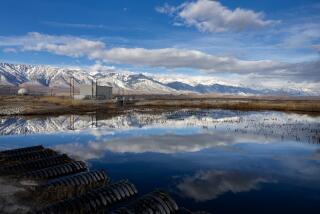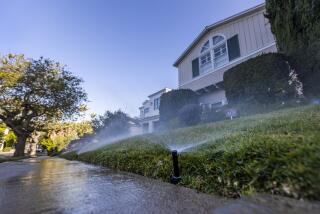Water Users Keeping a Tight Grip on Their Faucets : Conservation: Area residents are so used to cutting back that even after the lifting of drought restrictions, they have not returned to wasteful ways.
- Share via
Just before mandatory water rationing was imposed last year, The Times asked northern Los Angeles County residents what they were doing to save water. Those restrictions were lifted after an exceptionally wet year, and The Times last week revisited some of those same residents to find out how their water use has changed in the last 14 months.
Adrian Luka’s roses have yet to bloom.
Tiny buds cling to the year-old bushes planted in a neat row along the walkway to his Burbank home, although it may be awhile before they blossom in bursts of red and white and yellow.
But Luka, 79, is confident. The sacrifices he made to ensure that his roses got enough water during one of Southern California’s worst droughts included forsaking showers on the days he watered. It has become habit and, even now, with a year of mandatory water rationing ended by a wet winter, Luka is miserly with his water.
“I don’t go in the shower when I water,” said Luka, a retired bricklayer who emigrated from Yugoslavia in 1978. “It’s regular now.”
Like Luka, thousands of residents in the San Fernando, Antelope and Santa Clarita valleys are finding that after nearly two years of counting every drop, their water use continues to be well below pre-drought levels.
Whether through force of habit or through conscious effort, residents still keep a tight grip on their faucets, even though the threat of a hefty penalty no longer looms.
Los Angeles water officials are not surprised.
“The last time we had this type of situation, after the drought in 1977-78, it took three years for consumption to return to pre-drought levels,” said Ed Freudenberg, spokesman for the Department of Water and Power. Even after the rains that deluged Southern California, Los Angeles residents cut use by 20% over the year before, 5% more than they were required.
Water resources manager Jerry Gewe speculated that water conservation efforts of this drought will be more long-lasting than in previous dry spells, largely because of devices such as the 225,000 low-flush toilets and 1.5 million flow-restricting shower heads that have been installed since the drought began.
“These things won’t change, even if people’s attitudes do,” Gewe said.
And change they will, according to Jerry Shaw, a psychology professor at Cal State Northridge. “We’ll slowly return back to pre-crisis levels of water use,” he said, explaining that the complex cycle of behavioral and attitude changes begins to break down. “We begin to imitate each other’s wasteful habits and revert back to pre-crisis consumption levels.”
Rochelle Simms hopes that that is not the case with her four children, three of whom are under 6. Brought up in a house where water conservation is stressed, Simms said her children have become water cops who monitor their parents’ water use.
“They are always correcting us, reminding us to turn the water off while we wash our hands,” she said. “I don’t want to change that.”
A year ago, Simms said her family cut back water use severely to preserve the expanse of green lawn outside their Sherman Oaks home. The lawn survived the drought, and Simms said she gardens several times a week. Although she is still conscious of how much water her family uses, Simms said it is comforting to know that they will not be penalized if they exceed the monthly allotment.
“I don’t feel like I’m holding my breath so much,” she said. “Before when the bill came, I would wonder if we were OK. I don’t think you should get too comfortable. Things can change in another year.”
If they do, Herb and Frieda Margolis of Winnetka will be ready. Their garden of yucca and cactus has seen them through dry years before and it survived, even thrived, during the recent drought.
“We haven’t watered at all this year,” Margolis said as he inspected the brilliant orange plumes of a bird of paradise. “Nothing has changed, really.”
A year ago, Sherry Englund washed her Mazda RX-7 only when she could not stand to have it dirty any longer, at one point waiting six weeks. But in the meantime, her husband, Joel, has found a car wash in Burbank that recycles its water. “So I take it there once a week,” he said.
And back in Burbank, Adrian Luka said he fears something that he prayed for a year ago.
“The rain,” he said. “I can’t water the roses too much.”
More to Read
Sign up for Essential California
The most important California stories and recommendations in your inbox every morning.
You may occasionally receive promotional content from the Los Angeles Times.










